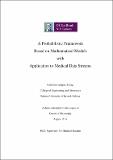| dc.contributor.advisor | Madden, Michael | |
| dc.contributor.author | Enright, Catherine | |
| dc.date.accessioned | 2013-07-31T11:41:23Z | |
| dc.date.available | 2013-07-31T11:41:23Z | |
| dc.date.issued | 2012-08-01 | |
| dc.identifier.uri | http://hdl.handle.net/10379/3572 | |
| dc.description.abstract | This thesis presents a new probability-based framework which exploits existing domain knowledge in the form of mathematical models and uses real-time data streams to individualise model parameters.
We apply this new framework to personalising drug dosage regimes in critically ill patients, using routinely collected bedside and lab data. However, it can equally be applied to engineering, medical and scientific problems where noisy temporal data must be analysed and domain knowledge in the form of ordinary differential equation (ODE) models is available.
The first contribution of this thesis is a methodology for incorporating ODEs in a Dynamic Bayesian Network (DBN) framework. By doing this, we can handle data and model uncertainty in a principled manner, perform temporal data mining with noisy and missing data, and can individualise model parameters to the patient automatically and continuously, using data streams.
For this first contribution a first-order Euler solver is encapsulated in the DBN framework. ODEs may be approximated more efficiently using higher-order solvers. A second contribution is therefore a methodology for encapsulating a higher-order solver and an assessment of when this is preferable.
The third contribution is a new Adaptive-Time Particle Filtering algorithm for performing efficient inference on our DBN framework. In standard DBN particle filtering, time steps are of fixed length. Our new algorithm allows the time step length to adapt automatically in each step, greatly improving the efficiency of inference.
The final contribution is to apply the above techniques to the problem of regulating glycaemia in intensive care patients. Hyperglycaemia is a common phenomenon in critical care and is associated with increased morbidity and mortality. However, critically ill patients have highly variable responses to the insulin that is administered to regulate glycaemia. A solution such as the one described here, that can individualise the dosage, could therefore be of great benefit. | en_US |
| dc.rights | Attribution-NonCommercial-NoDerivs 3.0 Ireland | |
| dc.rights.uri | https://creativecommons.org/licenses/by-nc-nd/3.0/ie/ | |
| dc.subject | Dynamic Bayesian networks | en_US |
| dc.subject | Ordinary differencial equations | en_US |
| dc.subject | Adaptive-time particle filtering | en_US |
| dc.subject | Glycaemia | en_US |
| dc.subject | Engineering and Informatics | en_US |
| dc.title | A Probabilistic Framework Based on Mathematical Models with Application to Medical Data Streams | en_US |
| dc.type | Thesis | en_US |
| dc.contributor.funder | SFI | en_US |
| dc.local.note | This thesis presents new techniques for incorporating mathematical models in a probabilistic framework. This novel framework is applied to the problem of tracking the interaction of glucose and insulin in critically ill patients. Using the data available at the bedside this framework tunes model parameters to the individual patient. | en_US |
| dc.local.final | Yes | en_US |
| nui.item.downloads | 1010 | |


